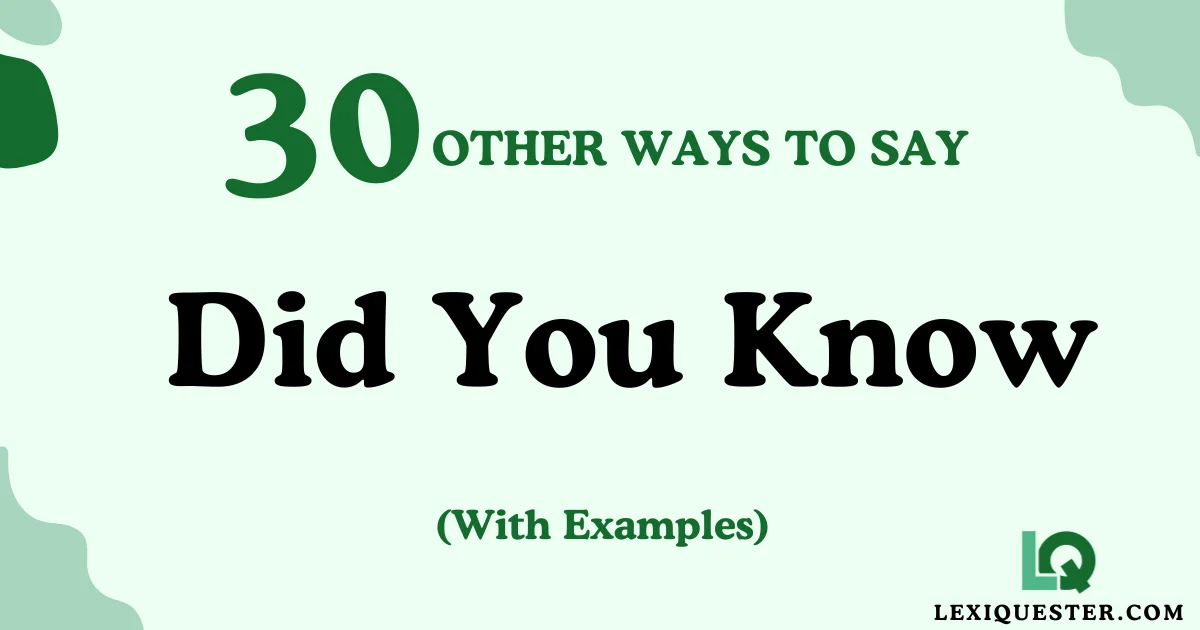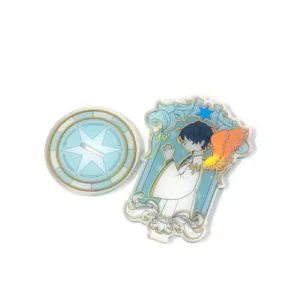In communication, the words we choose can make all the difference in how our message is received. Using thoughtful language conveys warmth, curiosity, and care—qualities that can transform even simple questions into meaningful interactions. If you want to make your questions feel more personal, these alternatives to “Did You Know” can help you engage your audience with empathy and genuine interest.
What Does “Did You Know” Mean?
“Did You Know” is a phrase often used to introduce interesting facts or information, inviting curiosity or attention. It’s commonly used in both casual and professional conversations as a gentle way to share information.
When to Use “Did You Know”
Use “Did You Know” when you want to share something intriguing, convey new insights, or add a conversational element to informative content. It’s an ideal way to spark interest and encourage engagement with light-hearted curiosity.
Is It Professional/Polite to Say “Did You Know”?
Yes, “Did You Know” is both professional and polite when used thoughtfully. It’s friendly, unobtrusive, and inclusive, making it suitable for professional settings as well as personal conversations. However, if you’re looking for a more formal alternative or something with a personal touch, consider using the alternatives below.
Did You Know Synonyms:
- Have You Heard About…
- Did You Realize…
- Guess What…
- Did You Ever Consider…
- Have You Noticed…
- Isn’t It Interesting That…
- I Recently Found Out…
- Have You Ever Wondered…
- Fun Fact…
- Did It Cross Your Mind That…
- You Might Find This Interesting…
- One Interesting Thing I Came Across…
- I Bet You Didn’t Know…
- I’ve Got a Little Trivia for You…
- Did It Ever Occur to You…
- Let Me Share Something Fascinating…
- Here’s a Thought…
- Can You Imagine…
- Have You Been Told…
- It’s Fascinating to Think About…
- Did You Happen to Know…
- Here’s a Fun Insight…
- Did You Ever Hear…
- What If I Told You…
- Here’s Something New…
- Little-Known Fact…
- Let Me Tell You a Secret…
- One Thing You Might Find Surprising…
- A Fun Little Detail…
- If You’re Interested…
1. “Have You Heard About…”
Meaning: Introduces new information that may not be widely known.
Tone: Casual, friendly, slightly mysterious.
Example: “Have you heard about the latest eco-friendly travel trends?”
Definition: This phrase opens with curiosity, drawing listeners in with the implication that they’re about to learn something new.
Explanation: Ideal for sharing recent news or insights, it subtly includes the listener as someone who might be in the know.
2. “Did You Realize…”
Meaning: Highlights information that might have been overlooked.
Tone: Thought-provoking, gentle.
Example: “Did you realize that practicing gratitude daily can improve your mood?”
Definition: Used to bring awareness to facts or perspectives.
Explanation: Perfect for sharing eye-opening details in a non-judgmental way, nudging the listener to consider the information.
3. “Guess What…”
Meaning: Creates suspense and builds excitement around new information.
Tone: Playful, engaging.
Example: “Guess what? You can actually visit this hidden library in the mountains!”
Definition: Invites curiosity, often used to share surprising or good news.
Explanation: This is a light-hearted approach for sharing unexpected information in an engaging way.
4. “Did You Ever Consider…”
Meaning: Encourages reflection on a new perspective.
Tone: Contemplative, gentle.
Example: “Did you ever consider how colors can affect your mood?”
Definition: Offers a prompt that encourages listeners to think about something in a new way.
Explanation: Ideal for sharing unique insights or personal reflections that may not be immediately obvious.
5. “Have You Noticed…”
Meaning: Brings attention to subtle details.
Tone: Observational, casual.
Example: “Have you noticed how people are shifting toward minimalism?”
Definition: Draws attention to trends, details, or behaviors that may have gone unnoticed.
Explanation: Perfect for pointing out trends, subtle shifts, or quiet changes that might be intriguing.
6. “Isn’t It Interesting That…”
Meaning: Suggests that the information is worth pondering.
Tone: Curious, thoughtful.
Example: “Isn’t it interesting that some people see improvement in their health just by meditating?”
Definition: Invites reflection and curiosity about something intriguing.
Explanation: This phrase works well when you want to encourage deeper thought on an unusual or lesser-known topic.
7. “I Recently Found Out…”
Meaning: Shares something new you’ve learned, inviting the listener to share in your discovery.
Tone: Personal, conversational.
Example: “I recently found out that dolphins have unique whistles like human names.”
Definition: Shares personal discovery, fostering connection.
Explanation: It makes the information feel like a shared experience and encourages connection.
8. “Have You Ever Wondered…”
Meaning: Invites curiosity and introspection.
Tone: Reflective, slightly philosophical.
Example: “Have you ever wondered why some people seem naturally happier?”
Definition: Encourages curiosity, often about universal questions.
Explanation: This phrase helps listeners connect to deeper ideas or explore big questions together.
9. “Fun Fact…”
Meaning: Prefaces a light-hearted or amusing piece of information.
Tone: Casual, playful.
Example: “Fun fact: Honey never spoils and can last for centuries!”
Definition: A light-hearted way to share entertaining or surprising information.
Explanation: Ideal for quick, bite-sized facts that are fun and engaging.
10. “Did It Cross Your Mind That…”
Meaning: Suggests that the information may not have been considered before.
Tone: Thoughtful, inquisitive.
Example: “Did it cross your mind that plants can communicate through root systems?”
Definition: Encourages reflection on a potentially overlooked idea.
Explanation: Perfect for introducing novel ideas or lesser-known facts in a gentle way.
11. “You Might Find This Interesting…”
Meaning: Suggests the information is worth the listener’s attention.
Tone: Polite, engaging.
Example: “You might find this interesting: reading before bed can help you sleep better.”
Definition: Politely invites curiosity without being intrusive.
Explanation: A good option for sharing information that feels personally relevant to the listener.
12. “One Interesting Thing I Came Across…”
Meaning: Shares a recent discovery in a casual, friendly way.
Tone: Thoughtful, inviting.
Example: “One interesting thing I came across is that trees can communicate through their roots.”
Definition: This phrase suggests a sense of discovery, inviting the listener into your experience.
Explanation: It’s perfect for creating a friendly and open atmosphere while sharing new knowledge.
13. “I Bet You Didn’t Know…”
Meaning: Implies that the information is surprising or not widely known.
Tone: Playful, intriguing.
Example: “I bet you didn’t know that the Eiffel Tower grows six inches taller in summer!”
Definition: Adds a sense of mystery, making the information feel exciting.
Explanation: Great for sparking curiosity with a light-hearted twist.
14. “I’ve Got a Little Trivia for You…”
Meaning: Introduces fun, interesting facts in a light way.
Tone: Fun, engaging.
Example: “I’ve got a little trivia for you: did you know koalas sleep up to 20 hours a day?”
Definition: A friendly way to introduce fun or random information.
Explanation: Ideal for sharing tidbits of knowledge that can brighten up conversations.
15. “Did It Ever Occur to You…”
Meaning: Suggests a fresh perspective or new way of thinking.
Tone: Reflective, curious.
Example: “Did it ever occur to you that music can affect your productivity?”
Definition: Opens the door for new thoughts or overlooked ideas.
Explanation: This is great for inviting the listener to consider something in a new light.
16. “Let Me Share Something Fascinating…”
Meaning: Signals that the information is particularly captivating.
Tone: Enthusiastic, warm.
Example: “Let me share something fascinating: the human body replaces its skin cells every month!”
Definition: Prepares the listener for something intriguing.
Explanation: This phrase creates a sense of shared enthusiasm for interesting facts.
17. “Here’s a Thought…”
Meaning: Presents an idea for contemplation or curiosity.
Tone: Casual, friendly.
Example: “Here’s a thought: What if you could start your day without checking your phone?”
Definition: Encourages reflection on a new concept.
Explanation: Ideal for introducing ideas in a relaxed way without needing an immediate answer.
18. “Can You Imagine…”
Meaning: Prompts the listener to envision something extraordinary.
Tone: Imaginative, engaging.
Example: “Can you imagine that some animals can regenerate lost limbs?”
Definition: Helps paint a picture of a surprising idea or fact.
Explanation: Perfect for storytelling or sharing surprising information that feels out-of-the-ordinary.
19. “Have You Been Told…”
Meaning: Implies the information may not be widely known or discussed.
Tone: Curious, slightly formal.
Example: “Have you been told that journaling can reduce stress?”
Definition: Adds an element of exclusivity to the information.
Explanation: This phrase makes the listener feel like they’re receiving special information.
20. “It’s Fascinating to Think About…”
Meaning: Highlights information that’s particularly thought-provoking.
Tone: Reflective, thoughtful.
Example: “It’s fascinating to think about how plants communicate.”
Definition: Adds intrigue by suggesting the information is worth deep thought.
Explanation: Best for inspiring curiosity and inviting deeper engagement with complex topics.
21. “Did You Happen to Know…”
Meaning: Asks if the listener is familiar with the information.
Tone: Casual, gentle.
Example: “Did you happen to know that bees can recognize human faces?”
Definition: A softer way of introducing information without assuming prior knowledge.
Explanation: Great for polite or low-key conversations where you want to be considerate of the listener.
22. “Here’s a Fun Insight…”
Meaning: Prefaces information that’s surprising or amusing.
Tone: Playful, engaging.
Example: “Here’s a fun insight: octopuses have three hearts!”
Definition: Suggests the information is light-hearted and fun to hear.
Explanation: This phrase is perfect for friendly or informal settings where lightheartedness fits.
23. “Did You Ever Hear…”
Meaning: Checks if the listener has previously encountered the information.
Tone: Curious, friendly.
Example: “Did you ever hear that penguins propose to their mates with a pebble?”
Definition: Invites the listener to think back and see if they know the fact.
Explanation: Ideal for inviting nostalgia or shared knowledge in a personal way.
24. “What If I Told You…”
Meaning: Sets up an unexpected or surprising piece of information.
Tone: Mysterious, intriguing.
Example: “What if I told you that some animals can sleep with half their brain awake?”
Definition: Creates suspense and interest, often used to share unusual facts.
Explanation: A great way to build suspense and draw the listener into the conversation.
25. “Here’s Something New…”
Meaning: Signals that the information is fresh or recent.
Tone: Inviting, enthusiastic.
Example: “Here’s something new: recent studies show that laughter can boost your immune system.”
Definition: Suggests the listener is about to learn something novel.
Explanation: Perfect for recent discoveries or current topics that are worth attention.
26. “Little-Known Fact…”
Meaning: Introduces obscure or lesser-known information.
Tone: Curious, engaging.
Example: “Little-known fact: A group of flamingos is called a ‘flamboyance.'”
Definition: Frames the information as something special or rare.
Explanation: Best for adding a sense of exclusivity to interesting trivia or fun facts.
27. “Let Me Tell You a Secret…”
Meaning: Implies that the information is exclusive or not widely known.
Tone: Playful, confidential.
Example: “Let me tell you a secret: plants respond positively to music.”
Definition: Creates intimacy and intrigue.
Explanation: Perfect for establishing a close connection with the listener while sharing unique knowledge.
28. “One Thing You Might Find Surprising…”
Meaning: Hints that the information is unusual or unexpected.
Tone: Polite, intriguing.
Example: “One thing you might find surprising: elephants can recognize themselves in a mirror!”
Definition: Sets up the listener for a pleasant surprise.
Explanation: A gentle way to introduce surprising or fascinating insights.
29. “A Fun Little Detail…”
Meaning: Prefaces a light-hearted or curious piece of information.
Tone: Casual, friendly.
Example: “A fun little detail: flamingos are only pink because of their diet.”
Definition: A light introduction to trivia.
Explanation: Ideal for adding playful elements to conversations without sounding too formal.
30. “If You’re Interested…”
Meaning: Allows the listener the option to learn more without pressure.
Tone: Polite, considerate.
Example: “If you’re interested, I can tell you about how some fish can change colors.”
Definition: An open-ended way to offer information.
Explanation: Respectful of the listener’s space, this phrase is perfect for sensitive or professional situations.
Conclusion
These alternatives to “Did You Know” offer a range of tones and styles, each bringing its own flavor to conversations. By using these phrases, you can add personality, warmth, or intrigue to your messages, making them more engaging and enjoyable for your listener.
Whether in casual chats, professional settings, or creative writing, these options allow you to share knowledge in ways that feel thoughtful and unique.
Recent Posts
- 30 Other Ways to Say “I Don’t Know” (With Examples)
- 30 Other Ways to Say “In Conclusion” (With Examples)
- 30 Other Ways to Say “Calm Your Tits” (With Examples)
- 30 Other Ways to Say “Happy To Help” (With Examples)
- 30 Other Ways to Say “Thank You For Your Quick Response” (With Examples)
- 30 Other Ways to Say “Keep up The Great Work” (With Examples)














